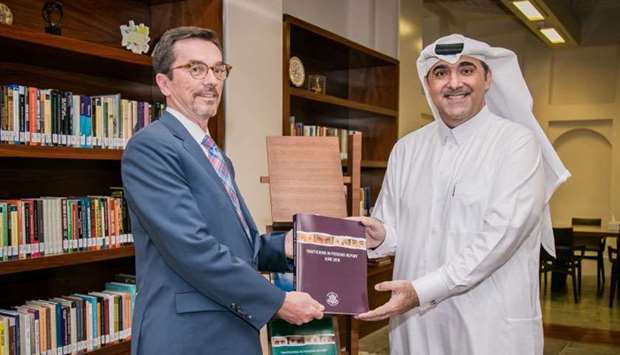William Grant, charge d’affaires at the US embassy, has presented the 2018 ‘Trafficking in Persons’ report to Msheireb Museums director Hafiz Ali for inclusion in the museum’s library.
The crime of human trafficking is the third-largest criminal activity in the world and affects every country on earth, including the US and Qatar. It is a form of modern-day slavery and includes commercial sex trafficking, forced labour, debt bondage, and domestic servitude. “The US embassy in Qatar and Msheireb Museums are partnering today to support the work of the museum to raise awareness about modern-day slavery,” the embassy said in a statement.
The annual report has become a significant part of the Msheireb Museums Library, specifically Bin Jelmood House, which provides a space for reflection on the story of slavery and how it has evolved into modern forms of human exploitation.
Every year, the US State Department releases the ‘Trafficking in Persons’ report that examines the efforts made by governments around the world to fight this crime. Ending human trafficking globally requires a co-ordinated approach between all countries, and an important part of the strategy to combat modern-day slavery, is raising public awareness, the statement notes.
Bin Jelmood House provides an opportunity for visitors to make a personal commitment to joining the fight against the various forms of human trafficking. As an educational platform, the museum has raised awareness with around 30,000 visits this year alone.
Ali said, “We are proud to receive the 2018 ‘Trafficking in Persons’ report for the second year. The ‘Trafficking in Persons' report will be an added value to our library in which students, researchers and visitors have access to use the report in their research and study. We thank the US embassy in Qatar for their effort, and look forward to strengthening our collaboration in the future.”
Grant added, “The Bin Jelmood House represents a bold and honest view on the theme of historical and modern-day slavery in Qatar. By showing guests of the museum the harsh reality of slavery and human trafficking, Msheireb is raising awareness within Qatar, and playing a critical role in driving the conversation on this topic forward. Our hope is that if we recognise and confront the tragic history of slavery and exploitation, we can all find ways to contribute to the solution.
“In doing so, we all take steps to end human trafficking, protect its most vulnerable victims, and make our communities and the world a safer place to live, grow up and flourish.”
In addition to playing a pivotal role in raising awareness about modern-day slavery, Msheireb Properties is developing a blueprint for sustainable urban planning for the future. Located within the oldest part of the capital, Msheireb Museums form an important part of Qatar’s national history and Msheireb Downtown Doha. All buildings within the development are targeting Gold LEED-certification (Leadership in Energy and Environmental Design), while several buildings will aim for a Platinum rating.
The downtown includes designs that involve US architects, consultants and contractors which include Burns & McDonnell, Burton Studios, HOK, TIG/m and Walker Consultants.
For more information, one can follow the US embassy in Qatar on Twitter @USEmbassyQatar and @USAmbQatar, and follow Msheireb Museums @MsheirebDoha
Fighting Human Trafficking
US collaboration with Qatar on fighting human trafficking is the ‘strongest it has ever been’
Ending human trafficking globally requires a co-ordinated approach between all countries, and as such, the US embassy in Doha noted that US collaboration with Qatar on fighting human trafficking is the “strongest it has ever been”.
Since signing the Anti-Trafficking memorandum of understanding with Qatar in January 2017, the US and Qatar have formed a partnership involving over 30 different offices and organisations, and completed over a dozen joint programmes - from training to exchanges and awareness-raising events like the initiative to present the ‘Trafficking in Persons’ report to Msheireb Museums, the embassy said in a statement.

